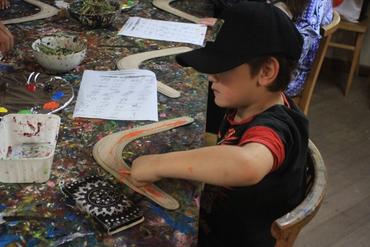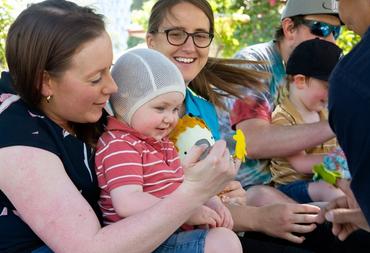Language acquisition for deaf children: What linguists can do.
New evidence suggests that if children are exposed to a first language in the critical period of their first years, they may develop complete fluent use of any language.

What was this paper about?
This paper explores evidence based recommendations indicating language acquisition is accelerated with early exposure to accessible language; sign or spoken.
The key recommendation of this paper is that all deaf babies and young children should learn a sign language, regardless of whether they receive a cochlear implant or hearing aid.
This is based on evidence about sensitive periods for language development, and about sign language offering a pathway to language acquisition. Studies indicate that if children lack adequate exposure to a first language in the critical period of their first years, they may never develop completely fluent use of any language.
Despite the evidence, parents are often advised that learning sign language will hinder their child’s development of spoken language. For children receiving a cochlear implant, the chance of long-term language success is variable. If they don’t learn sign language in the first few years of life, those children who don’t acquire spoken language with a cochlear implant may miss the critical window for early language development.
"Language access for deaf children is important for their psycho-social health."
There are two secondary reasons given for the recommendation about learning sign language. First, language access for deaf children is important for their psychosocial health. There are studies showing deaf children who don’t have their language needs met are at risk for depression, behavioural problems and social disorders. Conversely, language access is crucial for deaf children’s future participation in healthcare services, education, mental healthcare, the workplace and social relationships.
Second, the development of cognitive skills is interwoven with linguistic ability. Studies show failure to acquire language in the early years can cause children difficulty with verbal memory organisation, mastery of numeracy and literacy and higher-order cognitive processing such as executive function and theory of mind.
What were the key findings?
- Studies of deaf children who did not have enough exposure to accessible language, either due to lack of hearing aids or lack of exposure to sign language, showed less ability to comprehend language.
- Deaf Children who were first exposed to sign language developed greater mastery of language than later learners.
- For a deaf child with hearing parents to learn sign language, the entire family should learn, and deaf children should be given plenty of contact with deaf signing children and adults.
- Sign language can be made accessible to hearing parents and their deaf child.
Where can I read more about this paper?
Ensuring language acquisition for deaf children: What linguists can do.
Printable 439 KB PDF



